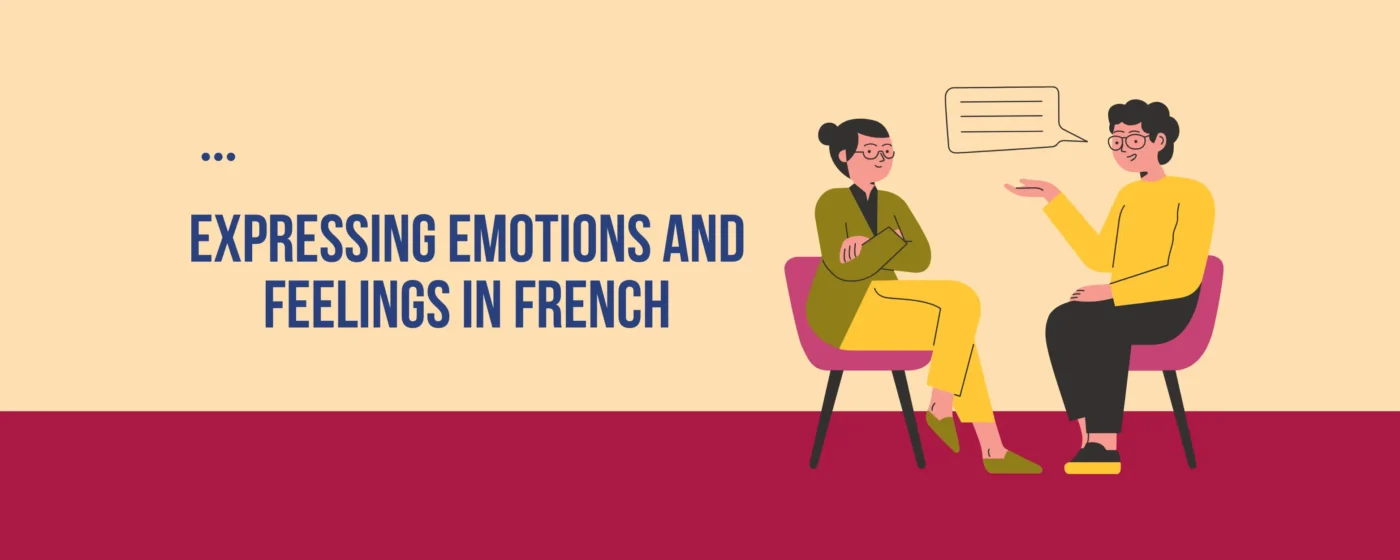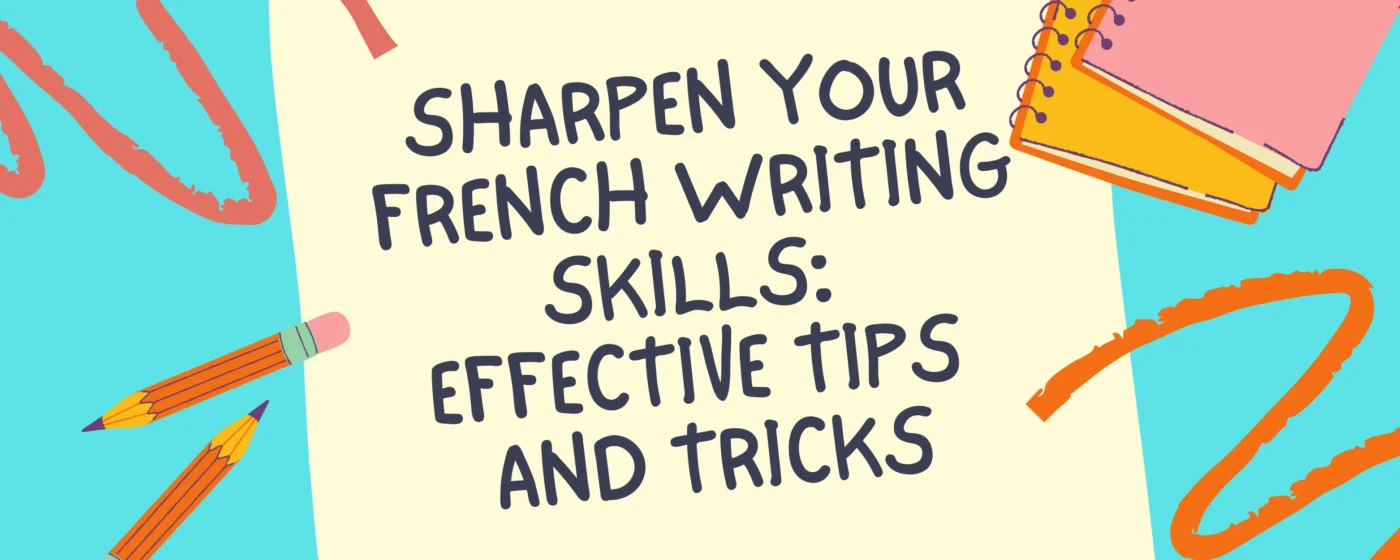French is a language renowned for its elegance, precision, and nuance. But did you know that it is also a language of profound emotion? From the passionate declarations of love to the subtle expressions of melancholy, French offers a rich palette for conveying your feelings. Mastering emotional vocabulary can deepen your connection with the language and culture, while also empowering you to communicate your inner world with clarity and authenticity.
In this guide, we’ll delve into the intricacies of French emotional expression! We’ll equip you with essential vocabulary, practical phrases, and cultural insights to help you navigate the complexities of the French heart.
Useful Phrases for Expressing Emotions
Here are the most commonly used phrases to express emotions in your daily life!
- Je suis tellement reconnaissant pour ton aide. – I am so grateful for your help.
- J’ai peur de ce qui va se passer. – I am scared of what is going to happen.
- Je suis si heureux de te voir! – I am so happy to see you!
- J’étais choqué quand j’ai entendu la nouvelle. – I was shocked when I heard the news.
- Je suis soulagé(e) d’avoir réussi l’examen. – I am relieved to have passed the exam.
Talking About Positive Emotions
| French Phrase | English Meaning | Example |
|---|---|---|
| J’ai le sourire aux lèvres. | I have a smile on my face. | La bonne nouvelle m’a donné le sourire aux lèvres. (The good news gave me a smile on my face.) |
| J’éprouve beaucoup de joie. | I feel a lot of joy. | J’éprouve beaucoup de joie en faisant du bénévolat. (I feel a lot of joy doing volunteer work.) |
| Je me sens merveilleusement bien. | I feel wonderful. | Je me sens merveilleusement bien après ces vacances. (I feel wonderful after these holidays.) |
| Je suis aux anges. | I am in seventh heaven. | J’ai gagné à la loterie, je suis aux anges! (I won the lottery, I am in seventh heaven!) |
| Je suis comblé(e) de bonheur. | I am filled with happiness. | Je suis comblé(e) de bonheur depuis la naissance de mon enfant. (I am filled with happiness since the birth of my child.) |
| Je suis fier(e) de… | I am proud of… | Je suis fier(e) de mes enfants. (I am proud of my children.) |
| Je suis ravi(e) de… | I am delighted to… | Je suis ravi(e) de votre visite. (I am delighted with your visit.) |
| Je suis très content(e) de… | I am very happy with… | Je suis très content(e) de mon nouveau travail. (I am very happy with my new job.) |
| Je suis très enthousiaste à l’idée de… | I am very enthusiastic about… | Je suis très enthousiaste à l’idée de partir en voyage. (I am very enthusiastic about going on a trip.) |
| Je suis très heureux/heureuse. | I am very happy. | Je suis très heureux de passer du temps avec vous. (I am very happy to spend time with you.) |
Expressing your interests in another language is exciting! Learn hobbies in French to talk about your passions fluently in conversations.
Discussing Negative Emotions
| French Phrase | English Meaning | Example |
|---|---|---|
| J’ai peur. | I am scared. | J’ai peur du noir. (I am afraid of the dark.) |
| Je me sens coupable. | I feel guilty. | Je me sens coupable de ne pas l’avoir aidé. (I feel guilty for not having helped him.) |
| Je me sens seul(e). | I feel lonely. | Je me sens seul(e) le week-end. (I feel lonely on weekends.) |
| Je suis anxieux/anxieuse. | I am anxious. | Je suis anxieux/anxieuse pour l’examen. (I am anxious about the exam.) |
| Je suis déçu(e). | I am disappointed. | Je suis déçu(e) de ne pas avoir été invité(e). (I am disappointed not to have been invited.) |
| Je suis en colère. | I am angry. | Je suis en colère contre lui pour avoir menti. (I am angry at him for lying.) |
| Je suis fatigué(e). | I am tired. | Je suis fatigué(e) après une longue journée de travail. (I am tired after a long day of work.) |
| Je suis frustré(e). | I am frustrated. | Je suis frustré(e) de ne pas pouvoir résoudre ce problème.(I am frustrated not to be able to solve this problem.) |
| Je suis jaloux/jalouse. | I am jealous. | Je suis jaloux/jalouse de ton nouveau téléphone. (I am jealous of your new phone.) |
| Je suis triste. | I am sad. | Je suis triste parce qu’il pleut. (I am sad because it’s raining.) |
Learning French? Let’s Make It Easy!
Join our courses and get expert tips that make French feel like second nature!
Describing Mixed Emotions and Ambivalence
| French Phrase | English Meaning | Example |
|---|---|---|
| C’est un sentiment mitigé. | It’s a mixed feeling. | C’est un sentiment mitigé. Je suis content(e) que le projet soit terminé, mais aussi soulagé(e) qu’il ne soit plus là. (It’s a mixed feeling. I am happy the project is finished, but also relieved that it’s over.) |
| D’un côté, je suis content(e) de…, mais d’un autre côté… | On the one hand, I am happy about…, but on the other hand… | D’un côté, je suis content(e) que tu m’aies offert un cadeau, mais d’un autre côté, ce n’est pas vraiment mon style. (On the one hand, I am happy that you got me a gift, but on the other hand, it’s not really my style.) |
| J’hésite à… | I am hesitant to… | J’hésite à annuler ma présentation, mais je sais que je dois le faire. (I am hesitant to cancel my presentation, but I know I have to do it.) |
| Je ne sais pas trop quoi ressentir à propos de… | I don’t know quite what to feel about… | Je ne sais pas trop quoi ressentir à propos du mariage de mon ex. (I don’t know quite what to feel about my ex’s wedding.) |
| Je suis partagé(e) entre… | I am torn between… | Je suis partagé(e) entre l’excitation de cette nouvelle opportunité et la tristesse de quitter mes amis. (I am torn between the excitement of this new opportunity and the sadness of leaving my friends.) |
Asking About Others’ Feelings
| French Phrase | English Meaning | Example |
|---|---|---|
| Ça va bien? | Is everything okay? | Ça va bien avec toi?(Is everything okay with you?) |
| Comment te sens-tu ? | How do you feel? | Comment te sens-tu après cette journée difficile?(How do you feel after this difficult day?) |
| Comment vas-tu? | How are you? | Comment vas-tu aujourd’hui? (How are you today?) |
| Qu’est-ce qui te rend heureux(se) / triste / en colère…? | What makes you happy / sad / angry…? | Qu’est-ce qui te rend triste en ce moment?(What makes you sad right now?) |
| Qu’est-ce que tu ressens? | What do you feel? | Qu’est-ce que tu ressens par rapport à ce projet?(What do you feel about this project?) |
| Tu as l’air… | You look… | Tu as l’air fatigué(e). Qu’est-ce qui se passe? (You look tired. What’s going on?) |
| Tu veux parler de ce qui te dérange? | Do you want to talk about what’s bothering you? | Tu veux parler de ce qui te dérange? Je suis là pour toi. (Do you want to talk about what’s bothering you? I’m here for you.) |
Did You Know?
- The French kiss their feelings – While not literally, the French often use kissing metaphors to express affection and love. For example: “faire la bise” (to kiss on the cheek) can be a way of greeting friends and family, but it also conveys affection! Isn’t that a cool little tidbit to know?
- The art of complaining – The French have a reputation for complaining, but it’s actually a form of emotional expression. Sharing frustrations with friends and family is a common way to bond!
- Silence can speak volumes – In French culture, silence can be just as meaningful as words! Sometimes, the best way to express deep emotions is through a thoughtful pause. Wow.
Learning French swear words can be tricky, as some expressions might land you in trouble. Understand their meanings before using them casually.
Frequently Asked Questions
1. How do I ask someone how they are feeling in French?
Ans: There are various ways to ask about someone’s feelings in French, depending on the formality of the situation.
Some common phrases include:
- Comment allez-vous? (formal)
- Comment ça va? (informal)
- Ça va? (very informal)
- Comment te sens-tu? (informal, when addressing someone you know well)
2. Are there any common French expressions or idioms related to emotions?
Ans: Yes, there are many French expressions and idioms related to emotions. Learning these can help you sound more natural and fluent in French!
For example:
- Avoir le cafard (to be depressed)
- Être fou de joie (to be overjoyed)
- Avoir la tête dans les nuages (to be daydreaming)





